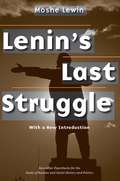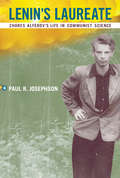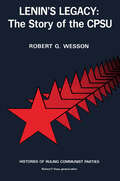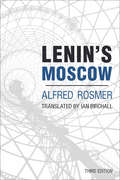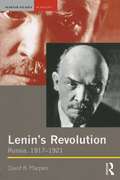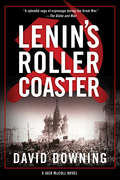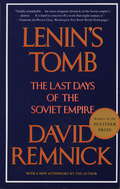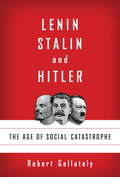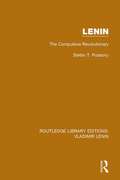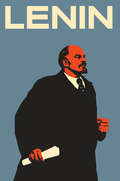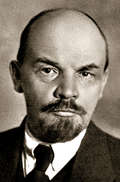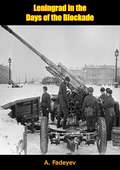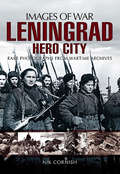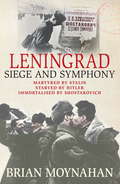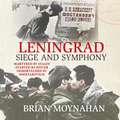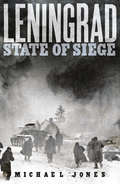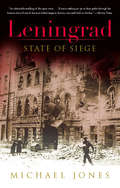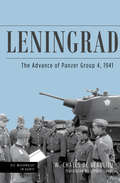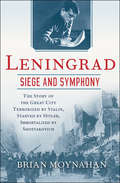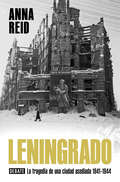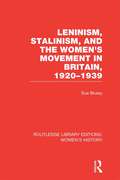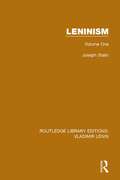- Table View
- List View
Lenin's Last Struggle
by Moshe LewinOne of the great political strategists of his era, V. I. Lenin continues to attract historical interest, yet his complex personality eludes full understanding. This new edition of Moshe Lewin's classic political biography, including an afterword by the author, suggests new approaches for studying the Marxist visionary and founder of the Soviet state. Lenin's Last Struggle offers invaluable insights into the rise of the Bolshevik party and the Soviet Union, a saga complicated by complex strategic battles among the leaders of Lenin's generation: leaders whose names are universally known, but whose personalities and motivations are even now not sufficiently understood.
Lenin's Laureate: Zhores Alferov's Life in Communist Science (Transformations: Studies in the History of Science and Technology)
by Paul R. JosephsonThe life and work of a leading Soviet physicist and an exploration of the strengths and weaknesses of Soviet science from Stalin through Gorbachev.In 2000, Russian scientist Zhores Alferov shared the Nobel Prize for Physics for his discovery of the heterojunction, a semiconductor device the practical applications of which include LEDs, rapid transistors, and the microchip. The Prize was the culmination of a career in Soviet science that spanned the eras of Stalin, Khrushchev, and Gorbachev—and continues today in the postcommunist Russia of Putin and Medvedev. In Lenin's Laureate, historian Paul Josephson tells the story of Alferov's life and work and examines the bureaucratic, economic, and ideological obstacles to doing state-sponsored scientific research in the Soviet Union. Lenin and the Bolsheviks built strong institutions for scientific research, rectifying years of neglect under the Czars. Later generations of scientists, including Alferov and his colleagues, reaped the benefits, achieving important breakthroughs: the first nuclear reactor for civilian energy, an early fusion device, and, of course, the Sputnik satellite. Josephson's account of Alferov's career reveals the strengths and weaknesses of Soviet science—a schizophrenic environment of cutting-edge research and political interference. Alferov, born into a family of Communist loyalists, joined the party in 1967. He supported Gorbachev's reforms in the 1980s, but later became frustrated by the recession-plagued postcommunist state's failure to fund scientific research adequately. An elected member of the Russian parliament since 1995, he uses his prestige as a Nobel laureate to protect Russian science from further cutbacks.Drawing on extensive archival research and the author's own discussions with Alferov, Lenin's Laureate offers a unique account of Soviet science, presented against the backdrop of the USSR's turbulent history from the revolution through perestroika.
Lenin's Legacy
by Robert WessonThis concise monograph traces Russian Marxism from its beginnings to mid-1977, shows how and why the party achieved power, how it has strengthened its position, and how it has undertaken to remold the country and to solve its internal problems. Wesson's study is the only up-to-date party history currently available. The book opens with background material on Russian discontent and endeavors to analyze the fundamental nature of Communist Party rule, taking into account new perspectives in Lenin's revolution, the Stalinist period, and the Khrushchev years, as well as the latest period not covered in earlier accounts. It treats the rise of Lenin, the struggle for power after Lenin and after Stalin, and the consolidation of Brezhnev's authority. As the most recent history of communism in the Soviet Union, it has great topical interest and is clearly written for the benefit of the student and general reader as well as the professional.
Lenin's Moscow
by Alfred Rosmer Ian BirchallWhen Alfred Rosmer arrived in Russia in 1919 it was considered by millions to be the center of world revolution. It was also a society beleaguered by civil war and encircled by hostile powers seeking to snuff out the promise and potential the first successful workers' revolution represented. It was in this context that revolutionaries from across the globe undertook the creation of the Communist International, hoping to forge an instrument to fan the flames of the struggle against global capitalism.In this gripping political memoir of his time in Moscow, Rosmer draws on his unique perspective as both a delegate to the Comintern-and as a member of its Executive Committee-to paint a stunning and inspiring picture of the early years of Soviet rule. From the debates sparked by the publication of Lenin's State and Revolution and Left-Wing Communism to the efforts of the International to extend its influence beyond Europe with the Congress of the Peoples of the East in Baku, Rosmer documents key developments with an unparalleled clarity of vision and offers invaluable insights.
Lenin's Revolution: Russia, 1917-1921 (Seminar Studies)
by David R. MarplesThis study examines one of the key events in history, the Russian Revolution. Since the late Gorbachev period, a wealth of new material has become available to historians that has triggered intense scholarly debate on the nature of revolution. This timely new book takes account of the new scholarship, including - for example - the role of Lenin. It is argued that the intial flexibility of Lenin and the Bolshevik party allowed them to take power, but that the conduct of both changed considerably once they were obliged to take steps to maintain their authority. This book charts the Febuary Revolution, the October Revolution, the Civil War and the main individuals involved, giving a remarkable degree of clarity to the tumultuous events in Russia whose consequences the world lived with for the rest of the twentieth century.
Lenin's Roller Coaster
by David DowningIn Russia the Bolshevik revolution is in full-swing while the supposed Great War is destroying Europe in ways never before imagined. Fulltime lovers and part-time enemies, British spy Jack McColl and progressive American journalist Caitlin Hanley, have seen their relationship survive this far but in a world defined by “win at all cost” attitudes how much longer can they hold out?Winter 1917: As a generation of Europe’s young men perish on the Eastern and Western fronts, British spy Jack McColl is assigned a sabotage mission deep in Central Asia, where German influence is strong. The mission only becomes more dangerous the closer he gets to its heart. Meanwhile, the woman he loves, Irish-American radical journalist Caitlin Hanley, is in Bolshevik Russia, thrilled to have the chance to cover the Revolution. Caitlin knows Moscow is where she is meant to be during this historic event—even if she is putting her own life at risk to bear witness.But four years of bloody war have taken their toll on all of Europe, and Jack and Caitlin’s relationship may become another casualty. Caitlin’s political convictions have always been for progress, feminism, and socialism—often diametrically opposed to the conservative goals of the British Empire Jack serves. Up until now, Jack and Caitlin have managed to set aside their allegiances and stay faithful to each other, but the stakes of their affair have risen too high. Can a revolutionary love a spy? And if she does, will it cost one of them their life?
Lenin's Tomb: The Last Days of the Soviet Empire
by David RemnickIn the tradition of John Reed's classic Ten Days That Shook the World, this bestselling account of the collapse of the Soviet Union combines the global vision of the best historical scholarship with the immediacy of eyewitness journalism. "A moving illumination . . . Remnick is the witness for us all." --Wall Street Journal.<P><P> Pulitzer Prize Winner
Lenin, Stalin, and Hitler: The Age of Social Catastrophe
by Robert GellatelyA bold new accounting of the great social and political upheavals that enveloped Europe between 1914 and 1945—from the Russian Revolution through the Second World War.In Lenin, Stalin, and Hitler, acclaimed historian Robert Gellately focuses on the dominant powers of the time, the Soviet Union and Nazi Germany, but also analyzes the catastrophe of those years in an effort to uncover its political and ideological nature. Arguing that the tragedies endured by Europe were inextricably linked through the dictatorships of Lenin, Stalin, and Hitler, Gellately explains how the pursuit of their “utopian” ideals turned into dystopian nightmares. Dismantling the myth of Lenin as a relatively benevolent precursor to Hitler and Stalin and contrasting the divergent ways that Hitler and Stalin achieved their calamitous goals, Gellately creates in Lenin, Stalin, and Hitler a vital analysis of a critical period in modern history.
Lenin: The Compulsive Revolutionary (Routledge Library Editions: Vladimir Lenin #3)
by Stefan T. PossonyOriginally published in the UK in 1966, this was the first biography of Lenin which tied together extensive material unearthed in WWII, and it illuminates the complex personality and explains the riddle of Lenin's seemingly impossible rise to power. Using primary sources such as previously inacessible documents from the German, Austrian and Japanese foreign offices, and the vast holdings of the Hoover Institution, the book cuts through many comtemporaneous myths in Communist sources. The volume is a landmark in the study of the birth of Soviet Communism and its revolutionary enterprise.
Lenin: The Man, the Dictator, and the Master of Terror
by Victor SebestyenVictor Sebestyen's riveting biography of Vladimir Ilyich Lenin—the first major biography in English in nearly two decades—is not only a political examination of one of the most important historical figures of the twentieth century but also a fascinating portrait of Lenin the man.Brought up in comfort and with a passion for hunting and fishing, chess, and the English classics, Lenin was radicalized after the execution of his brother in 1887. Sebestyen traces the story from Lenin's early years to his long exile in Europe and return to Petrograd in 1917 to lead the first Communist revolution in history. Uniquely, Sebestyen has discovered that throughout Lenin's life his closest relationships were with his mother, his sisters, his wife, and his mistress. The long-suppressed story told here of the love triangle that Lenin had with his wife, Nadezhda Krupskaya, and his beautiful, married mistress and comrade, Inessa Armand, reveals a more complicated character than that of the coldly one-dimensional leader of the Bolshevik Revolution.With Lenin's personal papers and those of other leading political figures now available, Sebestyen gives is new details that bring to life the dramatic and gripping story of how Lenin seized power in a coup and ran his revolutionary state. The product of a violent, tyrannical, and corrupt Russia, he chillingly authorized the deaths of thousands of people and created a system based on the idea that political terror against opponents was justified for a greater ideal. An old comrade what had once admired him said that Lenin "desired the good . . . but created evil." This included his invention of Stalin, who would take Lenin's system of the gulag and the secret police to horrifying new heights.In Lenin, Victor Sebestyen has written a brilliant portrait of this dictator as a complex and ruthless figure, and he also brings to light important new revelations about the Russian Revolution, a pivotal point in modern history.(With 16 pages of black-and-white photographs)
Lenine, o ditador. Um retrato íntimo
by Victor SebestyenNa Rússia, até hoje, Lenine inspira adulação. Continua a fascinar como homem que fez História ao criar um novo tipo de Estado, que, depois, foi imitado por quase metade dos países no mundo. Lenine acreditava que «o político é o pessoal», e, de modo algum ignorando a sua vida política, o foco de Sebestyen será sobre Lenine, o homem — um homem que amou a Natureza quase tanto quanto amava fazer a revolução e cujos laços e amizades foram estabelecidos com mulheres. A sua largamente escondida ménage à trois com a esposa, Nadezhda Krupskaya, e a amante e camarada, Inessa Armand, revela uma personagem diferente da figura fria e unidimensional da lenda. Contada através do prisma das relações-chave de Lenine, a vívida biografia de Sebestyen lança uma nova luz sobre a Revolução Russa, um dos grandes momentos decisivos da História moderna
Leningrad in the Days of the Blockade
by R. D. Charques A. FadeyevThe 900 day siege of Leningrad (now St. Petersburg) on the Baltic was perhaps one of the most iconic clashes of Nazi versus Soviet clashes to take place during the Second World War. Two and a half million Russians were trapped and encircled by Germand and Finnish forces, but despite freezing cold, scant supplies and little if any food, the city held out. In this book, noted Soviet author Alexander Alexandrovitch Fadeyev gives an eyewitness account of the horrific conditions of the city in the iron jaws of the Wehrmacht.
Leningrad: Hero City (Images of War)
by Nik CornishThe 900-day siege of the Soviet city of Leningrad by the combined forces of the Germans and the Finns is one of the most remarkable, and terrible, events of the Second World War, yet until recently it has not received the attention it deserves it has been overshadowed by other massive confrontations on the Eastern Front, at Stalingrad and Kursk. And rarely has the compelling story of the siege been told through graphic wartime photographs like those that author Nik Cornish has collected for this book. Many of these images have not been published before, and they give an unflinching insight into the reality of the conditions of the siege as it was experienced by the soldiers on each side and by the civilians trapped in the city who were threatened by starvation, disease, shelling and assault. The entire course of the siege is covered, from the encirclement of September 1941, through the successive attempts by the Wehrmacht to break in and the dogged, sometimes desperate defense put up by the Red Army, to the withdrawal of the Germans and the lifting of the siege in January 1944. Nik Cornishs portrait of the ruthless struggle of Hitlers armies to capture the second city of the Soviet Union and the determination and suffering of the defenders will be fascinating reading for everyone who is interested in the war on the Eastern Front.
Leningrad: Shaping a Soviet City (Lane Studies in Regional Government #8)
by Blair A. RubleThroughout much of this century, cities around the world have sought to gain control over their urban destinies through concerted government action. Nowhere has this process of state intervention gone further than in the Soviet Union. This volume explores the ways in which local and regional political, economic, and cultural leaders in Leningrad determine the physical and socioeconomic contours of their city and region within such a centralized economic and political environment. The author examines four major policy initiatives that have emerged in Leningrad since the 1950s—physical planning innovations, integrated scientific-production associations, vocational education reform, and socioeconomic planning—and that have been anchored in attempts to plan and manage metropolitan Leningrad. Each initiative illuminates the bureaucratic and political strategies employed to obtain economic objectives, as well as the bureaucratic patterns which distinguish market and non-market experiences. The boundaries for autonomous action by local Soviet politicians, planners, and managers emerge through this inquiry. This title is part of UC Press's Voices Revived program, which commemorates University of California Press's mission to seek out and cultivate the brightest minds and give them voice, reach, and impact. Drawing on a backlist dating to 1893, Voices Revived makes high-quality, peer-reviewed scholarship accessible once again using print-on-demand technology. This title was originally published in 1990.
Leningrad: Siege and Symphony
by Brian MoynahanShostakovich's Seventh Symphony was first played in the city of its birth on 9 August, 1942. There has never been a first performance to match it. Pray God, there never will be again. Almost a year earlier, the Germans had begun their blockade of the city. Already many thousands had died of their wounds, the cold, and most of all, starvation. The assembled musicians - scrounged from frontline units and military bands, for only twenty of the orchestra's 100 players had survived - were so hungry, many feared they'd be too weak to play the score right through. In these, the darkest days of the Second World War, the music and the defiance it inspired provided a rare beacon of light for the watching world. Setting the composition of Shostakovich's most famous work against the tragic canvas of the siege itself and the years of repression and terror that preceded it, Leningrad: Siege and Symphony is a magisterial and moving account of one of the most tragic periods in history.
Leningrad: Siege and Symphony
by Brian MoynahanIn Leningrad: Siege and Symphony, Brian Moynahan sets the composition of Shostakovich's most famous work against the tragic canvas of the siege itself and the years of repression and terror that preceded it.Drawing on extensive primary research in archives as well as personal letters and diaries, he vividly tells the story of the cruelties heaped by the twin monsters of the 20th century, Stalin and Hitler, on a city of exquisite beauty, and of its no less remarkable survival.Weaving Shostakovich's own story and that of many others into the context of the maelstrom of Stalin's purges and the Nazis' brutal invasion of Russia, Leningrad: Siege and Symphony is a magisterial and moving account of one of the most tragic periods of the twentieth century. (P)2013 WF Howes Ltd
Leningrad: State Of Siege
by Michael JonesWhen the German High Command encircled Leningrad it was a deliberate policy to eradicate the city?s civilian population by starving them to death. As winter set in and food supplies dwindled, starvation and panic set in. A specialist in battle psychology and the vital role of morale in desperate circumstances, Michael Jones tells the human story of Leningrad. Drawing on newly available eyewitness accounts and diaries, he shows Leningrad in its every dimension including taboo truths, long-suppressed by the Soviets, such as looting, criminal gangs and cannibalism. But, for many ordinary citizens, Leningrad marked the triumph of the human spirit. They drew deeply on their inner resources to inspire, comfort and help one another. At the height of the siege an extraordinary live performance of Shostakovich?s Seventh Symphony profoundly strengthened the city's will to resist. When German troops heard it in their trenches one remarked: `We began to understand we would never take Leningrad. Yet, Leningrad?s self-defence came at a huge price. When the 900-day siege ended in 1944 almost a million people had died and those who survived would be permanently marked by what they had endured, as this superbly insightful and moving history shows.
Leningrad: State of Siege
by Michael Jones"All offers of surrender from Leningrad must be rejected,” wrote Adolph Hitler on September 29, 1941, at the outset of Operation Barbarossa. "In this struggle for survival, we have no interest in keeping even a proportion of the city’s population alive. ” During the famed 900-day siege of Leningrad, the German High Command deliberately planned to eradicate the city’s population through starvation. Viewing the Slavs as sub-human, Hitler embarked on a vicious program of ethnic cleansing. By the time the siege ended in January 1944, almost a million people had died. Those who survived would be marked permanently by what they endured as the city descended into chaos. In Leningrad, military historian Michael Jones chronicles the human story of this epic siege. Drawing on newly available eyewitness accounts and diaries, he reveals the true horrors of the ordeal--including stories long-suppressed by the Soviets of looting, criminal gangs, and cannibalism. But he also shows the immense psychological resources on which the citizens of Leningrad drew to survive against desperate odds. At the height of the siege, for instance, an extraordinary live performance of Shostakovich’s Seventh Symphony profoundly strengthened the city’s will to resist. A riveting account of one of the most harrowing sieges of world history, Leningrad also portrays the astonishing power of the human will in the face of even the direst catastrophe.
Leningrad: State of Siege
by Michael JonesWhen the German High Command encircled Leningrad it was a deliberate policy to eradicate the city’s civilian population by starving them to death. As winter set in and food supplies dwindled, starvation and panic set in. A specialist in battle psychology and the vital role of morale in desperate circumstances, Michael Jones tells the human story of Leningrad. Drawing on newly available eyewitness accounts and diaries, he shows Leningrad in its every dimension including taboo truths, long-suppressed by the Soviets, such as looting, criminal gangs and cannibalism. But, for many ordinary citizens, Leningrad marked the triumph of the human spirit. They drew deeply on their inner resources to inspire, comfort and help one another. At the height of the siege an extraordinary live performance of Shostakovich’s Seventh Symphony profoundly strengthened the city's will to resist. When German troops heard it in their trenches one remarked: ‘We began to understand we would never take Leningrad. Yet, Leningrad’s self-defence came at a huge price. When the 900-day siege ended in 1944 almost a million people had died and those who survived would be permanently marked by what they had endured, as this superbly insightful and moving history shows.
Leningrad: The Advance of Panzer Group 4, 1941 (Die Wehrmacht Im Kampf Ser.)
by W. Chales de BeaulieuTranslated into English for the first time: A personal account of Operation Barbarossa by the Panzer Group 4 chief of general staff. When Operation Barbarossa launched, Army Group North was tasked with the operational objective of Leningrad. But between them and the city lay eight hundred kilometers of Baltic states, eighteen to twenty infantry divisions, two cavalry divisions, and eight or nine mechanized Red Army brigades. To succeed, it was apparent they would have to race through to the western Dvina and establish a bridgehead before the Russians exploited this natural feature to organize a defensive front. Panzer Group 4, which included LVI Panzer Corps and XLI Panzer Corps, was to lead the way. By the end of the first day, the group had pushed seventy kilometers into enemy territory. Red counterattacks on their unprotected flanks slowed them down, resulting in the tank battle of Raseiniai, but the group managed to capture Dünaburg on the Western Dvina on June 26, with a bridgehead established shortly thereafter. The group then pushed northeast through Latvia to the Stalin Line. In mid-July, General Erich Hoepner was preparing to push the last one hundred kilometers to Leningrad. But Wilhelm von Leeb, commander of the army group, had other plans for the group and the advance did not continue for several more weeks. In Leningrad—first published in German in 1961 and now translated into English for the first time—W. Chales de Beaulieu, Panzer Group 4 chief of staff, offers a detailed account of the group&’s advance, as well as an assessment of the fighting, an examination of the limitations imposed on Army Group North and their effects on the operation, and the lessons to be learned from their experiences in the Baltic States, concluding with a discussion of whether Leningrad could ever have been taken in the first place.
Leningrad: The Story of the Great City Terrorized by Stalin, Starved by Hitler, Immortalized by Shostakovich
by Brian MoynahanThe “gripping story” of a Nazi blockade, a Russian composer, and a ragtag band of musicians who fought to keep up a besieged city’s morale (The New York Times Book Review). For 872 days during World War II, the German Army encircled the city of Leningrad—modern-day St. Petersburg—in a military operation that would cripple the former capital and major Soviet industrial center. Palaces were looted and destroyed. Schools and hospitals were bombarded. Famine raged and millions died, soldiers and innocent civilians alike. Against the backdrop of this catastrophe, historian Brian Moynahan tells the story of Dmitri Shostakovich, whose Seventh Symphony was first performed during the siege and became a symbol of defiance in the face of fascist brutality. Titled “Leningrad” in honor of the city and its people, the work premiered on August 9, 1942—with musicians scrounged from frontline units and military bands, because only twenty of the orchestra’s hundred members had survived. With this compelling human story of art and culture surviving amid chaos and violence, Leningrad: Siege and Symphony “brings new depth and drama to a key historical moment” (Booklist, starred review), in “a narrative that is by turns painful, poignant and inspiring” (Minneapolis Star-Tribune). “He reaches into the guts of the city to extract some humanity from the blood and darkness, and at its best Leningrad captures the heartbreak, agony and small salvations in both death and survival . . . Moynahan’s descriptions of the battlefield, which also draw from the diaries of the cold, lice-ridden, hungry combatants, are haunting.” —The Washington Post
Leningrado: La tragedia de una ciudad asediada 1941-1944
by Anna ReidEl libro que rescata del olvido a los ciudadanos que quedaron atrapados entre los dos peores sistemas totalitarios de la historia. El 8 de septiembre de 1941, once semanas después de que Hitler lanzara el brutal ataque sorpresa contra la Unión Soviética, la denominada Operación Barbarroja, la ciudad de Leningrado fue sitiada. El asedio duró casi tres años y más de setecientos cincuenta mil civiles murieron de inanición. De haber caído la ciudad, la historia de la Segunda Guerra Mundial, y del siglo XX, habría sido muy distinta. Leningrado es un relato entreverado de historias personales que, a partir de crónicas y testimonios reales de diarios de ambos bandos, refleja la vida cotidiana de quienes vivieron el asedio, civiles europeos del siglo XX que soportaron terribles penurias: la búsqueda incesante de comida y agua; el desánimo progresivo y la pérdida de lazos familiares; saqueos, asesinatos y canibalismo; pero, al mismo tiempo, extraordinarias historias de valentía y entrega. Anna Reid revela también la decisión deliberada de los nazis de matar de hambre a los habitantes de Leningrado para llevarlos a la rendición, las consecuencias del error de cálculo de Hitler, la incompetencia y la crueldad de los altos mandos soviéticos. Asimismo, aborda una serie de preguntas que aún hoy piden respuesta: ¿el abrumador número de muertos fue tanto culpa de Stalin como de Hitler? ¿Cómo contribuyó al desastre la desconfianza de Stalin y Moscú hacia la antigua San Petersburgo, de tendencia occidental? ¿Por qué los alemanes no tomaron la ciudad? ¿Qué impidió que cayera en la anarquía? ¿Cómo lograron sobrevivir algunos? Un clásico indispensable, libro de referencia sobre el tema, hasta ahora inédito en castellano. La crítica ha dicho: «Una obra maestra. Con rigor y sin sensiblería, nos acerca una historia terrible, documentada con maestría y narrada de manera hermosa».Anthony Beevor «Magistral».Orlando Figes «Una forma admirable de narrar la extraordinaria historia del asedio. Retrata con intensidad lo que algunos consideramos el más espantoso episodio de la Segunda Guerra Mundial».Max Hastings «Impactante y necesario. Un estudio asombroso y conmovedor del precio impuesto por el poder político sin restricciones en ambos bandos».The Daily Mail «Un relato magistral y bellamente escrito, que genera un poderoso sentido de cercanía. Reid presta especial atención a los vívidos detalles humanos, sin ignorar el contexto más amplio».The Spectator «Documentado de manera impecable, con buen ritmo y una escritura bellísima, Leningrado es el nuevo libro de referencia sobre el tema, con una interpretación más afinada y objetiva para un nuevo siglo».Financial Times «Un relato detallado y desgarrador de la vida y la muerte en Leningrado que devuelve sus voces a las personas».The Wall Street Journal
Leninism, Stalinism, and the Women's Movement in Britain, 1920-1939 (Routledge Library Editions: Women's History)
by Sue BruleyThis book offers a detailed examination of the interaction between socialism and feminism through the lens of one particular socialist organisation, the Communist Party of Great Britain, from its foundation in 1920 until the outbreak of the Second World War. The study of socialism and feminism in the CPGB can be divided into four major areas – the party’s concept of socialism and the role of women in a future society; the party’s relationship to the feminist movement; the work of the party in relation to specific women’s issues; and how the sexual division of labour operated within the party. The author here defines and explains the socialist and feminist traditions in Britain and describes the ways in which they interacted, both at the level of theory and of practice. Sources from party press and reports to interviews with party members and non-party written and oral evidence and accounts feed into this thorough chronological treatment which outlays the changes within the CPGB during the 1920s and 30s in relation to feminism.
Leninism: Volume One (Routledge Library Editions: Vladimir Lenin #4)
by Joseph StalinTranslated from the Russian in 1928, this and the second volume of the same title give an invaluable picture of what the Russian leader Joseph Stalin understood by Leninism. Building on the pamphlet Foundations of Leninism, (which forms the first part of this book) the work presents a unified and complete work on the problems of Leninism and socialist construction as they were manifested in the 1920s, as well as discussion of the October Revolution and the relationship of the USSR and the West in the years following the First World War.
